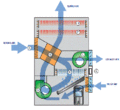Dehumidifier
Dehumidifier
A dehumidifier is an electrical appliance that reduces and maintains the level of humidity in the air, usually for health or comfort reasons, or to eliminate musty odor and to prevent the growth of mildew by extracting water from the air. It can be used for household, commercial, or industrial applications. Large dehumidifiers are used in commercial buildings such as indoor ice rinks and swimming pools, as well as manufacturing plants or storage warehouses.
Types of Dehumidifiers[edit]
There are primarily two types of dehumidifiers - refrigerative and desiccant.
Refrigerative Dehumidifiers[edit]
Refrigerative dehumidifiers work by drawing moist air over a refrigerated coil with a fan. The cold coil condenses the moisture in the air, turning it into water, which is then collected in a tank. These are most effective at warm temperatures and high humidity levels and are the most commonly used type of dehumidifiers in homes.
Desiccant Dehumidifiers[edit]
Desiccant dehumidifiers, on the other hand, use a desiccant material that absorbs moisture from the air. This type of dehumidifier can work at lower temperatures and is often used in industrial applications.
Applications[edit]
Dehumidifiers are used in various settings to control humidity levels:
- Residential: To improve comfort and prevent mold growth in homes, especially in damp areas such as basements and bathrooms.
- Commercial: In retail spaces, offices, and other commercial buildings to create a comfortable environment.
- Industrial: To protect goods and control processes in industries such as food and beverage, pharmaceuticals, and manufacturing.
Health Benefits[edit]
Maintaining optimal humidity levels (typically between 30% and 50%) can have several health benefits, including:
- Preventing the growth of mold and mildew, which can lead to respiratory problems.
- Reducing the prevalence of dust mites and allergens in the air.
- Alleviating symptoms of asthma and allergies by reducing humidity levels.
Considerations[edit]
When choosing a dehumidifier, consider the following factors:
- Size and Capacity: The size of the area and the level of humidity you need to control.
- Energy Efficiency: Look for models with an Energy Star rating to ensure energy efficiency.
- Noise Level: Especially important in residential settings.
- Maintenance: Consider the ease of cleaning and emptying the water tank.
Environmental Impact[edit]
While dehumidifiers can improve air quality and comfort, they also consume energy. Choosing an energy-efficient model and using it wisely can help minimize its environmental impact.
See Also[edit]
| Climate control systems and technologies | ||||||||||
|---|---|---|---|---|---|---|---|---|---|---|
This climate control related article is a stub. You can help WikiMD by expanding it.
|
| Home appliances | ||||||||
|---|---|---|---|---|---|---|---|---|
This home appliance related article is a stub.
|
-
Maytag dehumidifier
-
Heat recovery process
-
Mitsubishi Electric Oasis MJ-E16VX dehumidifier
-
Large desiccant dehumidification system
Ad. Transform your life with W8MD's Budget GLP-1 injections from $75


W8MD offers a medical weight loss program to lose weight in Philadelphia. Our physician-supervised medical weight loss provides:
- Weight loss injections in NYC (generic and brand names):
- Zepbound / Mounjaro, Wegovy / Ozempic, Saxenda
- Most insurances accepted or discounted self-pay rates. We will obtain insurance prior authorizations if needed.
- Generic GLP1 weight loss injections from $75 for the starting dose.
- Also offer prescription weight loss medications including Phentermine, Qsymia, Diethylpropion, Contrave etc.
NYC weight loss doctor appointmentsNYC weight loss doctor appointments
Start your NYC weight loss journey today at our NYC medical weight loss and Philadelphia medical weight loss clinics.
- Call 718-946-5500 to lose weight in NYC or for medical weight loss in Philadelphia 215-676-2334.
- Tags:NYC medical weight loss, Philadelphia lose weight Zepbound NYC, Budget GLP1 weight loss injections, Wegovy Philadelphia, Wegovy NYC, Philadelphia medical weight loss, Brookly weight loss and Wegovy NYC
|
WikiMD's Wellness Encyclopedia |
| Let Food Be Thy Medicine Medicine Thy Food - Hippocrates |
Medical Disclaimer: WikiMD is not a substitute for professional medical advice. The information on WikiMD is provided as an information resource only, may be incorrect, outdated or misleading, and is not to be used or relied on for any diagnostic or treatment purposes. Please consult your health care provider before making any healthcare decisions or for guidance about a specific medical condition. WikiMD expressly disclaims responsibility, and shall have no liability, for any damages, loss, injury, or liability whatsoever suffered as a result of your reliance on the information contained in this site. By visiting this site you agree to the foregoing terms and conditions, which may from time to time be changed or supplemented by WikiMD. If you do not agree to the foregoing terms and conditions, you should not enter or use this site. See full disclaimer.
Credits:Most images are courtesy of Wikimedia commons, and templates, categories Wikipedia, licensed under CC BY SA or similar.
Translate this page: - East Asian
中文,
日本,
한국어,
South Asian
हिन्दी,
தமிழ்,
తెలుగు,
Urdu,
ಕನ್ನಡ,
Southeast Asian
Indonesian,
Vietnamese,
Thai,
မြန်မာဘာသာ,
বাংলা
European
español,
Deutsch,
français,
Greek,
português do Brasil,
polski,
română,
русский,
Nederlands,
norsk,
svenska,
suomi,
Italian
Middle Eastern & African
عربى,
Turkish,
Persian,
Hebrew,
Afrikaans,
isiZulu,
Kiswahili,
Other
Bulgarian,
Hungarian,
Czech,
Swedish,
മലയാളം,
मराठी,
ਪੰਜਾਬੀ,
ગુજરાતી,
Portuguese,
Ukrainian



